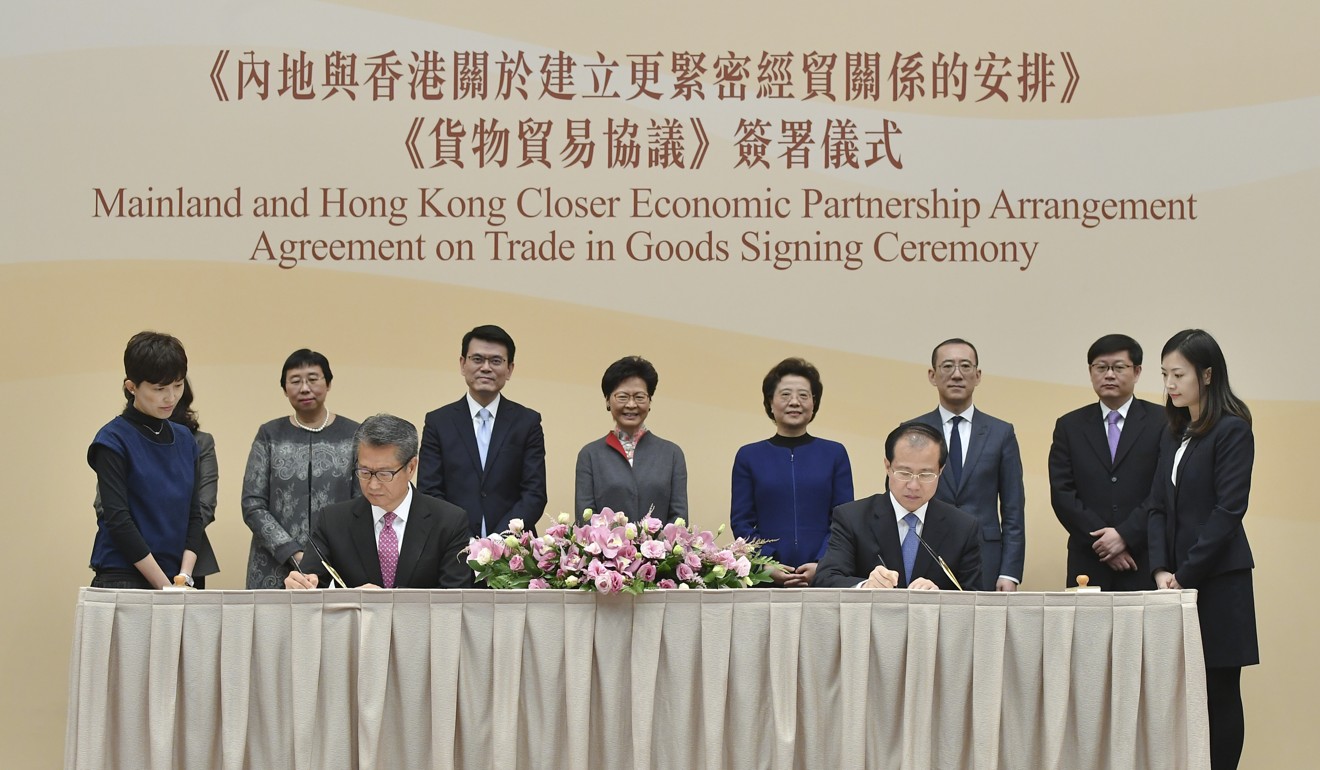
Beijing removes barrier to trade between Hong Kong and Greater Bay Area as new agreement scraps tax on goods being sent across the border
- Businesses get a boost as new deal further opens up Greater Bay Area market
Local businesses have been given a boost after Hong Kong signed an agreement removing tariffs from goods being exported to the “Greater Bay Area”, a new economic zone in southern China, and liberalising key service sectors.
Friday’s deal, signed by the city and central government, removes tax and customs barriers between Hong Kong and the Greater Bay Area.
In a pilot scheme, the city’s service sectors in finance, education, tourism and culture will be allowed to launch in the Greater Bay Area – Beijing’s project to integrate Hong Kong, Macau and nine Guangdong cities into a financial and technological hub.
Financial Secretary Paul Chan Mo-po and Fu Ziying, the vice-minster of commerce, signed the agreement at a ceremony witnessed by Hong Kong’s leader, Carrie Lam Cheng Yuet-ngor.

“The agreement shows trade relations between Hong Kong and the mainland are of the highest level, ushering in a new phase of cooperation,” Fu said.
Chan said the move would improve the flow of goods in the Greater Bay Area.
“It will deepen free trade on both sides and help Hong Kong brands break into the mainland Chinese market,” he said.
The agreement, which is part of the Closer Economic Partnership Arrangement, or CEPA, is expected to take effect on January 1.
Hong Kong is caught in the crossfire of the trade war between the United States and China, with about half of the goods exported to the US from the mainland subject to tariffs. This is despite a 90-day ceasefire as the two sides attempt to negotiate a permanent settlement.
China and Hong Kong sign two trade agreements giving local firms preferential investment access
Hong Kong was China’s third-largest trade partner last year, after the United States and Japan. The mainland’s imports of goods made in Hong Kong stood at US$7.3 billion in 2017, but US$279.3 billion in goods were sent in the opposite direction.
There are 6,000 items involved in the latest agreement, with the bulk of them having been subject to a tariff ranging between 0.8 per cent and 65 per cent. Previously, CEPA already provided import tax exemptions on 1,901 made in Hong Kong items.
Aron Harilela, chairman of the city’s largest business chamber, the Hong Kong General Chamber of Commerce, described the agreement as a “Christmas gift” for companies under the shadow of the US-China trade war.
“The new agreement does not cover the mutual recognition of examination and quarantine results of animals and plants and related products, as well as food and pharmaceutical products. We hope the government will further enhance CEPA to include these areas,” he said.
Dennis Ng Wan-pun, president of the Chinese Manufacturers’ Association, said the agreement would be positive for Hong Kong entrepreneurs.
“As the city is pushing re-industrialisation, investors will have access to more opportunities on the mainland market,” he said. “It will be good for hi-tech or high-value-added products which are made in Hong Kong.”
Focus on economy not politics, Chinese vice-president tells Hong Kong business leaders
In a separate development, during the meeting of the Mainland and Hong Kong Economic and Trade Cooperation Committee on Friday, Chan and Fu agreed to place priorities on five areas – enhance and implementing CEPA, supporting Hong Kong’s participation in the Belt and Road Initiative, jointly promote trade cooperation in the Greater Bay Area, and help the city’s participation in regional economic cooperation.
In terms of liberalising Hong Kong services across the border, the two sides reached a consensus to relax the geographic restrictions on the city’s law firms setting up partnerships with mainland firms.
Now, partnership with mainland Chinese counterparts will be allowed across the country, instead of being restricted to Guangzhou, Shenzhen and Zhuhai.

